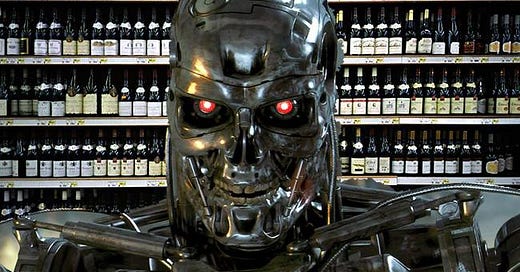Unnatural Influence: Bots in Wine Media
Wine is peculiarly susceptible to social media con artists, for the simple reason that many truly influential figures in wine are new to social media.
Here are plausible reasons for possessing massive social media reach in the wine world: being a famous winemaker, chef or restaurateur; being a legendary importer, or a veteran sommelier with a star-studded, decades-long résumé; being a wine critic for a major publication; having written several well-received books on the subject; or some combination of these things.
Here are implausible reasons for possessing massive social media reach in the wine world: writing a blog; being a really good photographer; freelancing for newspapers; using hashtags like a champ.
Social media users boasting massive, 40k+ reach in the wine world for implausible reasons have probably purchased followers. It is quite simple to do, quite difficult to prove, and there are no consequences for getting caught doing it. It seems to be quite common. Last January, an illuminating New York Times article on the bot economy reported that a mere $225 will purchase no fewer than 25,000 Twitter followers. Vox reported on similar services for Instagram back in 2014.
I only twigged last fall, when in the span of two months several industry friends - a winemaker, a restaurateur, and an importer - separately approached me asking if I knew the young personality behind one particular, apparently stratospherically successful wine Instagram account.
I did not. But a cursory examination of the situation seemed to indicate the user had purchased many of his or her followers. No one knew precisely what the person did in the wine business; nor did the user possess any significant media by-lines. There was no way to explain why this semi-anonymous user's apparent reach vastly exceeded that of most genuine recognisable wine industry superstars. I hadn't given this issue much thought before; neither had my industry friends.
Upon reflection, wine is peculiarly susceptible to social media con artists, for the simple reason that many truly influential figures in wine are new to social media, and unlikely to be aware of bot fraud. I mean winemakers at renowned estates, along with most other wine personalities who attained renown before the advent of social media. The exchange rate between their true, unquantifiable influence and the supposedly quantifiable influence of individual social media users is totally unclear to all parties involved. It becomes eminently possible to parlay perceived social media influence into access to the upper echelons of the wine world.
A successful social media con artist doesn't even have to monetise his or her newfound influence immediately; in wine, access to the industry is its own currency, redeemable at some indeterminate date in the future.
Astute readers may observe that all this is just part of the social media game. Everyone posting bottle shots and winemaker selfies and cellar visits - myself included - is complicit. Is the difference between a standard social media user and one attempting to win undue influence by purchasing followers merely a question of the scale of unscrupulousness?
I don't think so. There's a reason the idea of purchasing followers kind of sticks in our collective craw. This sort of fraud bothers us because it directly contradicts the meritocratic veneer of social media.
From the dawn of MySpace to the high noon of Instagram, social media optimists have touted how such platforms democratise influence: how they permit any random Joe to be heard and attain sway. I've benefitted from this dynamic myself. (I'd never have had the patience or the will to try wine writing if it meant first obtaining certification from the traditional arbiters of wine knowledge - sommelier guilds, WSET degrees, etc. - as it often did before the blog era.)
The meteoric rise of fraudster bot impresarios on social media disturbs us because it suggests our optimism is delusional. The reach of money still surpasses that of expertise or experience or social media savvy.
Such was my response, to the winemaker, the importer, and the restaurateur, who each independently asked me who the heck that particular Instagram user was.
"I don't know," I said. "Presumably some clever rich kid."
All we can do is shake our heads and try to promote a more nuanced understanding of the limits of social media influence. There are, after all, more urgent situations deriving from similar phenomena.
FURTHER READING
New York Magazine asks, in this January 2019 feature, "Is it Time to Regulate Social Media Influencers?"
A January 2018 New York Times feature on the bot economy.
A September 2014 report in Vox on "The Dirty Business of Buying Instagram Followers."
Instagram's November 2018 message to users declaring its intention to reduce "inauthentic activity" on the service.
A 2016 humour piece I wrote about wine and social media.



